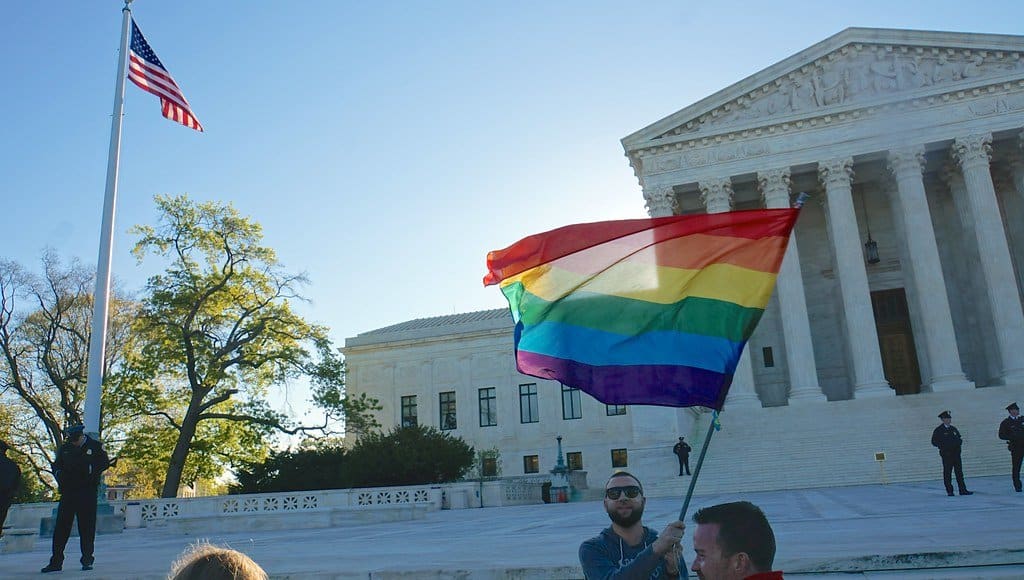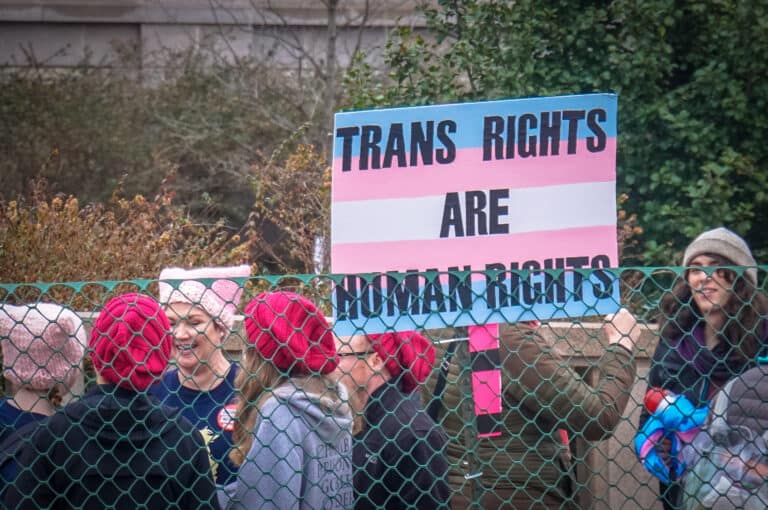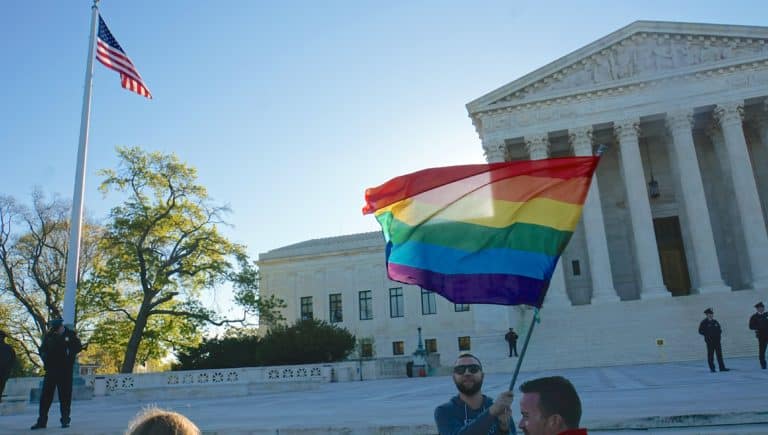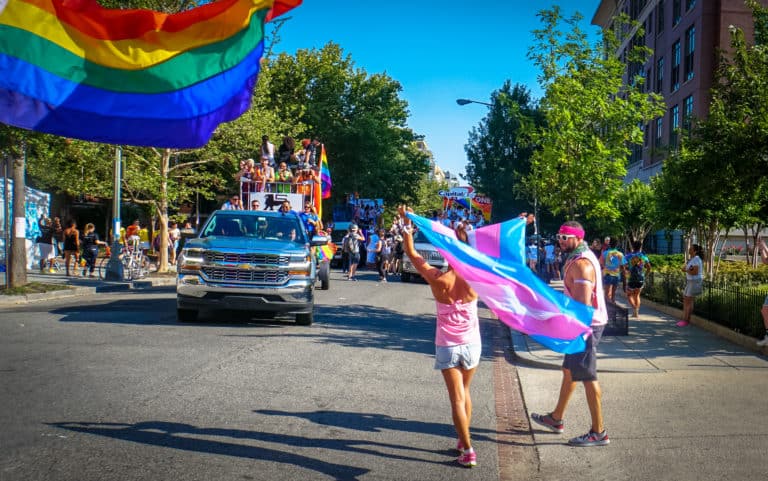The LGBTQ employees in Bostock, Zarda, and Harris also received amicus support from academics and religious organizations.
Scholars and Academics
A group of historians argue that the public meaning of sex discrimination in the first decade after Title VII’s enactment was broad enough to encompass LGBTQ discrimination. The brief compiles evidence of LGBTQ workers who brought claims under Title VII in its early days, with active encouragement from some at the EEOC. Only in 1975, when conservative backlash to both the women’s and LGBTQ equality movements escalated, did the EEOC and federal courts develop a clear position that Title VII did not reach discrimination on the basis of sexual orientation and gender identity.
A group of employment discrimination scholars explain that Title VII safeguards individuals from sex discrimination on the basis of sex stereotypes, rebutting an argument that the statute only serves to prohibit discrimination that disadvantages employees of one sex relative to another. Consequently, the employer still violates Title VII if it would have discriminated against both a lesbian and a gay man, a bisexual man and a bisexual woman, or a transgender man and a transgender woman. Even if Price Waterhouse did not articulate this understanding of Title VII’s anti-stereotyping principle, courts have long applied the principle in a diverse array of situations.
A group of anti-discrimination scholars claim that Title VII’s bar against sex stereotyping necessarily prohibits discrimination because of sexual orientation and gender identity. Just because lower courts have taken too long to reach this conclusion does not mean that the Supreme Court should repeat their error.
A group of statutory interpretation and equality law scholars discuss how a textualist reading of Title VII’s bar against discrimination because of sex requires the statute’s application to discrimination because of sexual orientation and gender identity. Defining sex at the time of Title VII’s passage as “biological sex,” the brief’s authors contend that employers could not discriminate against employees on the basis of their LGBTQ identity without taking biological sex into account. It is irrelevant whether observers in 1964 anticipated such an application, because the text governs. Moreover, efforts by future legislatures to pass laws that include sexual orientation and gender identity as protected categories alongside sex do not suggest a narrow meaning of sex discrimination, because Congress often passes overlapping protections. The failure to pass such a law with respect to employment discrimination at most indicates that some lawmakers did not believe Title VII’s protections for LGBTQ workers were sufficiently secure.
A group of philosophy professors claim that same-sex attraction and gender nonconformity cannot be logically separated from sex. In order for an employer to take adverse action against an employee based on either attribute, it must presume that employee’s sex and account for the social expectations that flow from it.
A group of corpus linguistics scholars contend that corpus linguistics, which evaluates how words have been used in their everyday context, is a superior mode of statutory interpretation compared to judicial intuition or dictionary definitions. With the aid of real-world texts from the 1960s, the brief’s authors explain that, at the time Title VII was enacted, the word “sex” was the single term used to convey what we now express as sex, gender, and sexual orientation. Still, they acknowledge that the employees in all three cases should prevail even if sex is understood as just biological sex.
A group of law and history professors argue that congressional intent is immaterial in Harris because the text of Title VII unambiguously bars discrimination on the basis of gender identity. However, the history of Title VII’s passage also suggests no intention to exclude transgender people from the law’s protections against sex discrimination. Lawmakers in 1964 were aware of people who presented in ways other than their sex assigned in birth, as evidenced by a wave of news stories about “sex change surgeries” in the press. They had the knowledge necessary to carve transgender people out of the law’s reach if they desired. Each of the four times Title VII was significantly amended, Congress again opted not to exclude transgender people despite growing awareness about their existence.
A group of scholars who study the transgender population report that there are at least 1.55 transgender Americans who all have the potential to thrive if they are not subject to discrimination and mistreatment. The negative consequences of gender identity discrimination at work demonstrate that it is a “comparable evil” to other types of discrimination prohibited by Title VII. A group of scholars who study the lesbian, gay, and bisexual population make a similar argument with respect to the estimated 11.5 million LGB Americans.
Professors William N. Esridge Jr. and Andrew M. Koppelman urge the Court to refrain from subtracting groups from Title VII because of historic prejudice against them and instead apply the public meaning of the text adopted by Congress. While it “is appropriate to exclude something from coverage from the literal meaning when it does not implicate the statutory plan or purpose,” that is not the case here. Title VII was a statute that sought to broadly transform society, and a limited interpretation of sex discrimination would betray that purpose.
Professors Samuel R. Bagenstos, Michael C. Dorf, Martin S. Lederman, Leah M. Litman, and Margo Schlanger give the Court one way to rule in favor of Stephens without deciding that Title VII bars discrimination against transgender people because they are transgender. Harris Homes fired Stephens for refusing to follow a dress code for employees it classified as men. While sex-based dress codes and grooming standards are typically “innocuous” in that they do not operate to deprive people of employment opportunities, a requirement that transgender people follow the rules for a sex they do not identify with actually deprives them of access to work because compliance would cause significant distress. The dress codes and grooming standards are thus unlawful as applied.
Religious Groups
A group of American-Muslim organizations, led by the Muslim Bar Association, say that Title VII clearly bars discrimination because of sexual orientation and gender identity for the same reason that it bars discrimination because of interracial marriage or religious conversion—the employer must consider the employee’s sex, race, or religion in order to discriminate. Muslims and LGBTQ people both face frequent workplace discrimination, and any decision limiting Title VII’s extension to LGBTQ workers will have consequences for Muslim workers, too. For instance, if the Court holds that sexual orientation and gender identity discrimination is not sex discrimination when it applies equally to both sexes, this could mean discriminatory practices such as prohibiting head coverings at work would not violate Title VII when they apply equally to people of all religions.
The Presiding Bishop and President of the House of Deputies of the Episcopal Church, the United Synagogue of Conservative Judaism, the General Synod of the United Church of Christ, the Central Conference of American Rabbis, and more than 700 individual faith leaders call attention to the widespread support among diverse faith groups for laws that affirm the dignity of LGBTQ people. Moreover, they state that finding in favor of the LGBTQ employees in these cases would not interfere with fundamental rights of religious belief and practice.










Daily News & Commentary
Start your day with our roundup of the latest labor developments. See all
June 30
Antidiscrimination scholars question McDonnell Douglas, George Washington University Hospital bargained in bad faith, and NY regulators defend LPA dispensary law.
June 29
In today’s news and commentary, Trump v. CASA restricts nationwide injunctions, a preliminary injunction continues to stop DOL from shutting down Job Corps, and the minimum wage is set to rise in multiple cities and states. On Friday, the Supreme Court held in Trump v. CASA that universal injunctions “likely exceed the equitable authority that […]
June 27
Labor's role in Zohran Mamdani's victory; DHS funding amendment aims to expand guest worker programs; COSELL submission deadline rapidly approaching
June 26
A district judge issues a preliminary injunction blocking agencies from implementing Trump’s executive order eliminating collective bargaining for federal workers; workers organize for the reinstatement of two doctors who were put on administrative leave after union activity; and Lamont vetoes unemployment benefits for striking workers.
June 25
Some circuits show less deference to NLRB; 3d Cir. affirms return to broader concerted activity definition; changes to federal workforce excluded from One Big Beautiful Bill.
June 24
In today’s news and commentary, the DOL proposes new wage and hour rules, Ford warns of EV battery manufacturing trouble, and California reaches an agreement to delay an in-person work mandate for state employees. The Trump Administration’s Department of Labor has advanced a series of proposals to update federal wage and hour rules. First, the […]